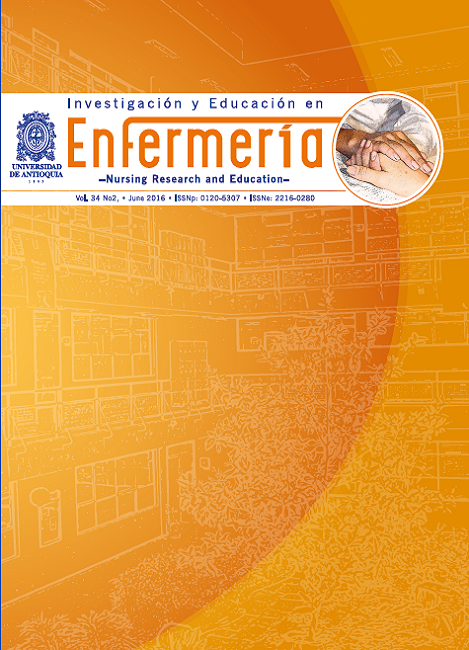Depression in pregnancy. Prevalence and associated factors
DOI:
https://doi.org/10.17533/udea.iee.323268Keywords:
Alcoholic beverages, cross-sectional studies, depression, domestic violence, nursing, pregnancy, smoke.Abstract
Objective. To evaluate the occurrence of depression during pregnancy and its associated factors.
Methods. Epidemiological, quantitative, descriptive and cross-sectional study, conducted from January to May 2013 with 209 pregnant women in the city of Alfenas, State of South Minas Gerais, Brazil. The Hospital Anxiety and Depression Scale (HASD) of Zigmond y Snaith and a form for characterization of participants were used for data collection.
Results. Depression was present in 14.8% of the pregnant women and was more frequent during the second trimester of pregnancy. Depression during pregnancy was significantly associated with number of births, number of children, ranking as the number of pregnancies, family support, amount of cigarettes smoked per day, consumption of alcohol, use of daily medications, history of mental disorder, presence of striking events in the last 12 months and history of domestic violence.
Conclusion. The evaluation of depression showed that this disorder is common during pregnancy, and the risk is higher among primigravidae women, women who use alcohol, use daily medications, have history of mental disorder, have experienced a striking event in the last 12 months and who have suffered domestic violence. Knowledge of the factors associated with occurrence of depression allows early adoption of interventions to monitor the mental health of women throughout pregnancy, preventing this and other disorders.
How to cite this article: Silva MMJ, Leite EPRC, Nogueira DA, Clapis MJ. Depression in pregnancy. Prevalence and associated factors. Invest. Educ. Enferm. 2016; 34(2):
Downloads
References
(1) Apter G, Devouche E, Gratier M. Perinatal mental health. J. Nerv. Ment. Dis. 2011; 199(8):575–7.
(2) Pereira PK, Lovisi GM, Lima LA, Legay LF. Complicações obstétricas, eventos estressantes, violência e depressão durante a gravidez em adolescentes atendidas em unidade básica de saúde. Rev. Psiquiatr. Clín. 2010; 37(5):216-22.
(3) World Health Organization. Mental Health Aspects of Women’s Reproductive Health: A Global Review of the Literature. Geneva: WHO; 2009.
(4) Pereira PK, Lovisi GM, Pilowsky DL, Lima LA, Legay LF. Depression during pregnancy: prevalence and risk factors among women attending public health in Rio de Janeiro, Brasil. Cad. Saúde Pública. 2009; 25(12):2725-36.
(5) Grote N, Bridge JA, Gavin AR, Melville JL, Iyengar S, Katon WJ. A meta-analysis of depression during pregnancy and the risk of preterm birth, low birth weight, and intrauterine growth restriction. Arch. Gen. Psychiatry.2010; 67(10):1012–24.
(6) Giardinelli L, Innocenti A, Benni L, Stefanini MC, Lino G, Lunardi C, et al. Depression and anxiety in perinatal period: prevalence and factors in an Italian sample. Arch. Womens Ment. Health. 2012; 15(1):21–30.
(7) Zigmond AS, Snaith RP. The hospital anxiety and depression scale. Acta Psychiatr. Scand. 1983; 67:361-70.
(8) Resolução Nº 196/96 do Conselho Nacional de Saúde, de 10 de outubro de1996 (BR). Aprova as diretrizes e normas regulamentadoras de pesquisas envolvendo seres humanos. Diário Oficial da União. 10 out. 1996.
(9) Gourounti K, Anagnostopoulos F, Lykeridou K. Coping strategies as psychological risk factor for antenatal anxiety, worries, and depression among Greek women. Arch. Womens Ment. Health. 2013; 16(1):353–61.
(10) Manikkam L, Burns J. Antenatal depression and its risk factors: an urban prevalence study in KwaZulu-Natal. S. Afr. Med. J. 2012; 102:940–4.
(11) Piccinini CA Gomes AG, De Nardi T, Lope RS. Gestação e a constituição da maternidade. Psicol. Est. 2008;13(1):63-72.
(12) Spice K, Jones S, Hadjistavropoulos HD, Kowalyk C, Stewart SH. Prenatal fear of childbirth and anxiety sensitivity. J. Psychosom Obstet. Gynecol. 2009;30(1):168–74.
(13) Nordeng H, Hansen C, Garthus-Niegel S, Eberhard-Gran M. Fear of childbirth, mental health, and medication use during pregnancy. Arch. Womens Ment. Health. 2012; 15(1):203–9.
(14) Vythilingum B, et al. Screening and pathways to maternal mental health care in a South African antenatal setting. Arch. Womens Ment. Health. 2013;16(1):371– 9.
(15) Fisher J, Tran T, La BT, Kriitmaa K, Rosenthal D, Tran T. Common perinatal mental disorders in northern Viet Nam: community prevalence and health care use. Bull. World. Health Organ. 2010; 88(1):737–45.
(16) Moreira MC, Sarriera JC. Satisfação e composição da rede de apoio social a gestantes adolescentes. Psicol. Estud. 2008; 13(4):781-9.
(17) Thiengo DL, Pereira PK, Santos JFC, Calvacanti MT, Lovisi GM. Depressão durante a gestação e os desfechos na saúde do recém-nascido: coorte de mães atendidas em unidade básica de saúde. J. Bras. Psiquiatr. 2012; 61(4):214-20.
(18) Marcus SM. Depression during pregnancy: rates, risks and consequences. Can. J. Clin. Pharmacol. 2009; 16(1):15–22.
(19) Pinheiro SN, Laprega MR, Furtado EF. Morbidade psiquiátrica e uso de álcool em gestantes usuárias do Sistema Único de Saúde. Rev. Saúde Pública. 2005; 39(4):593-8.
(20) Esper LH, Furtado EF. Associação de eventos estressores e morbidade psiquiátrica em gestantes. SMAD - Rev. Eletrônica Saúde Mental Álcool Drog. 2010; 6(n esp):368-86..
(21) Tzilos GK. Psychosocial factors associated with depression severity in pregnant adolescents. Arch. Womens Ment. Health. 2012; 15(1):397–401.
Downloads
Published
How to Cite
Issue
Section
License
Derechos de propiedad / Direitos de Propriedade
English: If the article is accepted for publication, all copyright will be of exclusive property of Investigación y Educación en Enfermería. The text and the graphics included in the publication are exclusive responsibility of the authors and not necessarily reflect the thought of the Editorial Committee.
Español: Si el artículo es aprobado para publicación, todos los derechos son de propiedad de Investigación y Educación en Enfermería. El texto y las gráficas incluidas en la publicación son de exclusiva responsabilidad de los autores y no necesariamente refleja el pensamiento del Comité Editorial.
Português: Se o artigo for aceito para publicação, todos os direitos autorais serão de propriedade exclusiva de Investigación y Educación en Enfermería. O texto e os gráficos incluídos na publicação são de responsabilidade exclusiva dos autores e não refletem necessariamente o pensamento do Comitê Editorial.















